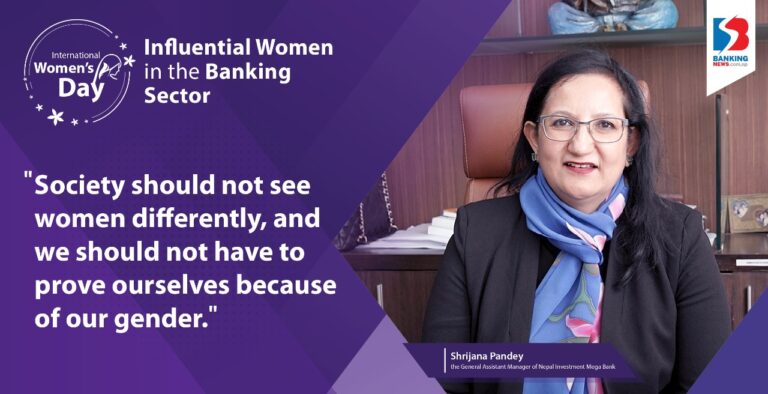Banking News – The banking sector is considered one of the most women-friendly fields, offering a secure working environment and the potential for women to become economically empowered. It helps women become self-reliant and financially strong. Due to its dual benefits of recognition and financial gain, many young women aspire to join the banking sector.
A prominent example of this is Shrijana Pandey, the General Assistant Manager of Nepal Investment Mega Bank. According to her, banking is a sector that not only provides job security but also offers opportunities for women to elevate their financial status. However, she notes that with the growing competition, entering the banking industry is no longer as easy as it once was.
Shrijana was born and raised in Kathmandu. Her father worked as an employee at Nepal Bank, and her grandfather had also worked in the same field. It was this family background that inspired her to pursue a career in banking. As her father worked in various locations, Shrijana had the opportunity to observe the country’s geography closely. She completed her early education in Kathmandu and various other places, but for her higher education (class 11, 12, and graduation), she chose to study in Bangalore, India.
She pursued her Master’s degree at Tribhuvan University in Kathmandu. As a child, Shrijana was very interested in music, and she admired the legendary Nepali singer Narayan Gopal. She was deeply moved by his death, even visiting Pashupati without a companion to offer flowers. Her love for music was so deep that she would often ask her father to bring back CDs of his music.
How She Became a Banker
Shrijana was always a good student, and many people encouraged her to study science. However, when she went to India for further studies, she decided to pursue commerce instead. After completing her studies in commerce, banking became her first choice. With her father being a banker, there was little hesitation for her to enter the field.
However, before joining banking, she had to face many challenges. She applied to numerous jobs and, after some time, found a position at International Leasing & Finance. She worked there for three years, but soon realized that the limited opportunities in finance were not fulfilling. She then applied to Nepal Investment Mega Bank and got selected. Shrijana has now been with NIMB for over 22 years and has handled various departments within the bank.
In her opinion, over the past decade, there has been a significant change in the participation of women in banking. While earlier women were seen mostly in lower-level positions, now even regulatory bodies have seen increasing participation from women. “Earlier, women worked only in lower positions, especially in government banks. But now, we are seeing women in higher positions as well,” she says. She believes that as more women participate, the role of women in banking is evolving.
Managing Time and Family Responsibilities
While Shrijana believes the banking sector provides a good environment for women to work, she also acknowledges that managing time can be difficult for women compared to men. She recalls facing various challenges while her child was young. She had to balance office meetings and take care of a sick child at home. “When my child was small, I had to manage meetings at work while also dealing with a sick child at home. I couldn’t leave the meetings, and it was hard to look after my child. But my family supported me through it all,” she shares.
As her position in the bank grew, so did her responsibilities. Shrijana is extremely satisfied with her work and finds joy in being able to provide financial assistance to people in need. However, she admits that being in a higher position in the bank comes with its own set of challenges. “When you reach a higher position, the responsibilities increase,” she explains.
She firmly believes that women should never sit back and say, “I am a woman, so I can’t do this.” In her work, she always stays prepared to handle whatever comes her way. “Women must fulfill their responsibilities regardless of the situation,” she says.
She also mentions that societal discrimination between men and women is slowly fading in urban areas, and there is no reason to view women separately. “Society should not see women differently, and we should not have to prove ourselves because of our gender,” she concludes.
This article is part of a special weekly series prepared by Banking News, in celebration of International Women’s Day (March 8), featuring interviews with women in leadership roles within the banking and insurance sectors.



 About Us
About Us
Comment